Logistics and Organizational Structure of Blue Parcel: A Report
VerifiedAdded on 2022/12/21
|22
|7234
|50
Report
AI Summary
This report provides a comprehensive analysis of Blue Parcel, an international B2C logistics provider. It examines their processes, including receiving consolidated shipments, registering parcels, sorting, and handing them over to logistics partners. The report delves into the company's background, processes, and relevant rules and regulations. It discusses potential changes in organizational structure and logistics, including information management, inventory, employee quality, and standard operating systems. The analysis includes designing a governance structure, compliance with government rules, a capability map, and applying enterprise architecture principles. Furthermore, it covers a business support matrix, critical analysis of the business structure, comparison of application options, and their impact on the business, concluding with key findings and recommendations for improvement.
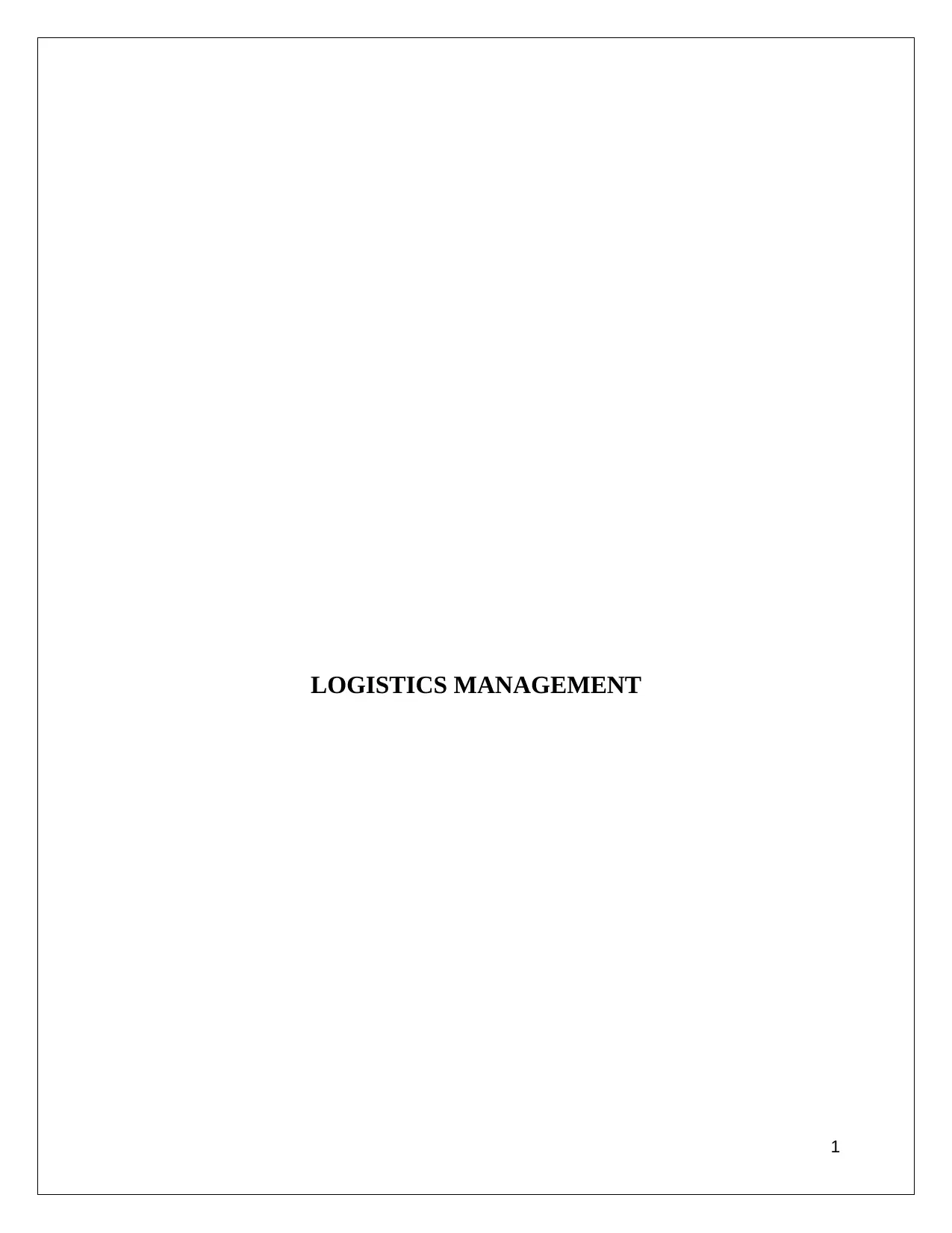
LOGISTICS MANAGEMENT
1
1
Paraphrase This Document
Need a fresh take? Get an instant paraphrase of this document with our AI Paraphraser
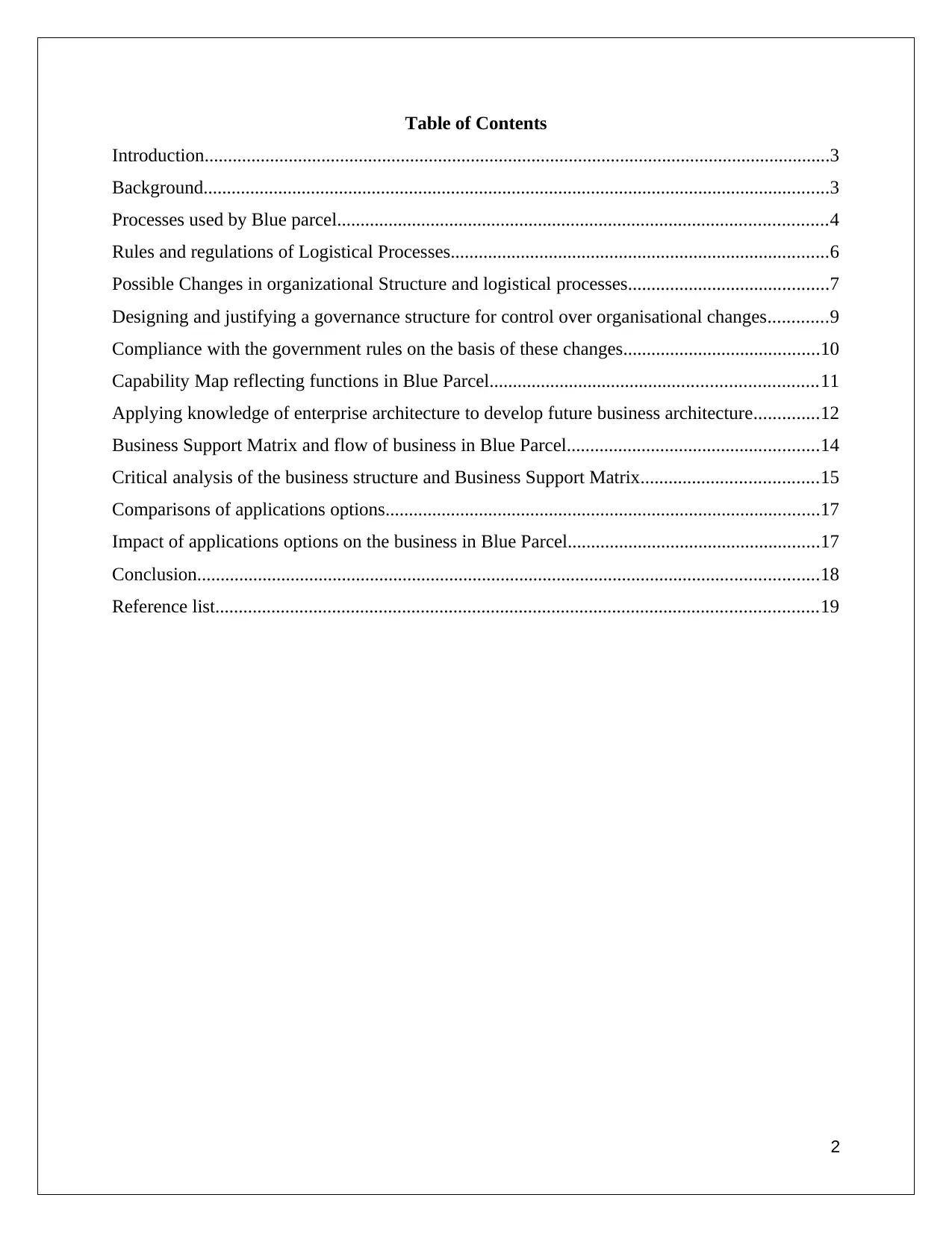
Table of Contents
Introduction......................................................................................................................................3
Background......................................................................................................................................3
Processes used by Blue parcel.........................................................................................................4
Rules and regulations of Logistical Processes.................................................................................6
Possible Changes in organizational Structure and logistical processes...........................................7
Designing and justifying a governance structure for control over organisational changes.............9
Compliance with the government rules on the basis of these changes..........................................10
Capability Map reflecting functions in Blue Parcel......................................................................11
Applying knowledge of enterprise architecture to develop future business architecture..............12
Business Support Matrix and flow of business in Blue Parcel......................................................14
Critical analysis of the business structure and Business Support Matrix......................................15
Comparisons of applications options.............................................................................................17
Impact of applications options on the business in Blue Parcel......................................................17
Conclusion.....................................................................................................................................18
Reference list.................................................................................................................................19
2
Introduction......................................................................................................................................3
Background......................................................................................................................................3
Processes used by Blue parcel.........................................................................................................4
Rules and regulations of Logistical Processes.................................................................................6
Possible Changes in organizational Structure and logistical processes...........................................7
Designing and justifying a governance structure for control over organisational changes.............9
Compliance with the government rules on the basis of these changes..........................................10
Capability Map reflecting functions in Blue Parcel......................................................................11
Applying knowledge of enterprise architecture to develop future business architecture..............12
Business Support Matrix and flow of business in Blue Parcel......................................................14
Critical analysis of the business structure and Business Support Matrix......................................15
Comparisons of applications options.............................................................................................17
Impact of applications options on the business in Blue Parcel......................................................17
Conclusion.....................................................................................................................................18
Reference list.................................................................................................................................19
2
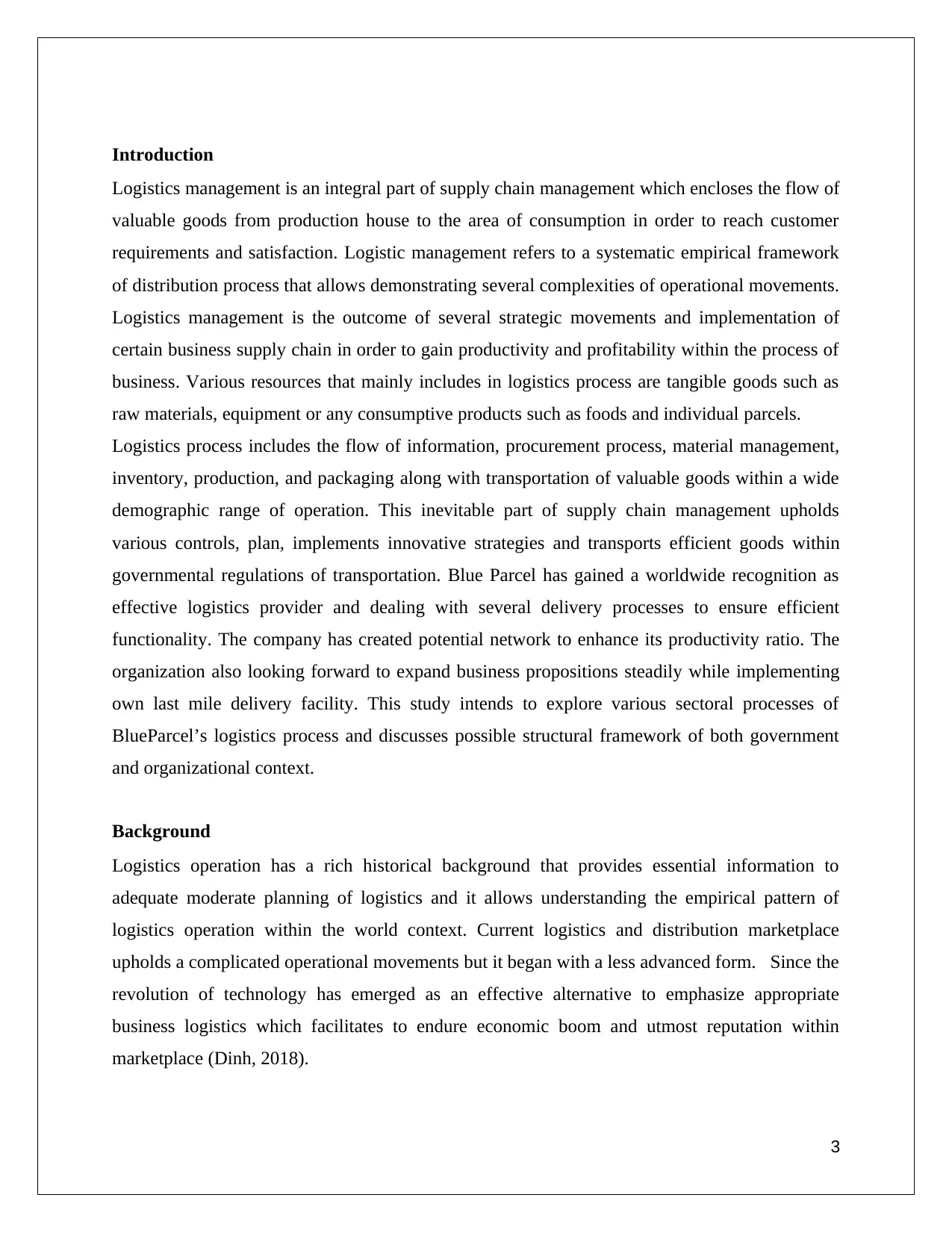
Introduction
Logistics management is an integral part of supply chain management which encloses the flow of
valuable goods from production house to the area of consumption in order to reach customer
requirements and satisfaction. Logistic management refers to a systematic empirical framework
of distribution process that allows demonstrating several complexities of operational movements.
Logistics management is the outcome of several strategic movements and implementation of
certain business supply chain in order to gain productivity and profitability within the process of
business. Various resources that mainly includes in logistics process are tangible goods such as
raw materials, equipment or any consumptive products such as foods and individual parcels.
Logistics process includes the flow of information, procurement process, material management,
inventory, production, and packaging along with transportation of valuable goods within a wide
demographic range of operation. This inevitable part of supply chain management upholds
various controls, plan, implements innovative strategies and transports efficient goods within
governmental regulations of transportation. Blue Parcel has gained a worldwide recognition as
effective logistics provider and dealing with several delivery processes to ensure efficient
functionality. The company has created potential network to enhance its productivity ratio. The
organization also looking forward to expand business propositions steadily while implementing
own last mile delivery facility. This study intends to explore various sectoral processes of
BlueParcel’s logistics process and discusses possible structural framework of both government
and organizational context.
Background
Logistics operation has a rich historical background that provides essential information to
adequate moderate planning of logistics and it allows understanding the empirical pattern of
logistics operation within the world context. Current logistics and distribution marketplace
upholds a complicated operational movements but it began with a less advanced form. Since the
revolution of technology has emerged as an effective alternative to emphasize appropriate
business logistics which facilitates to endure economic boom and utmost reputation within
marketplace (Dinh, 2018).
3
Logistics management is an integral part of supply chain management which encloses the flow of
valuable goods from production house to the area of consumption in order to reach customer
requirements and satisfaction. Logistic management refers to a systematic empirical framework
of distribution process that allows demonstrating several complexities of operational movements.
Logistics management is the outcome of several strategic movements and implementation of
certain business supply chain in order to gain productivity and profitability within the process of
business. Various resources that mainly includes in logistics process are tangible goods such as
raw materials, equipment or any consumptive products such as foods and individual parcels.
Logistics process includes the flow of information, procurement process, material management,
inventory, production, and packaging along with transportation of valuable goods within a wide
demographic range of operation. This inevitable part of supply chain management upholds
various controls, plan, implements innovative strategies and transports efficient goods within
governmental regulations of transportation. Blue Parcel has gained a worldwide recognition as
effective logistics provider and dealing with several delivery processes to ensure efficient
functionality. The company has created potential network to enhance its productivity ratio. The
organization also looking forward to expand business propositions steadily while implementing
own last mile delivery facility. This study intends to explore various sectoral processes of
BlueParcel’s logistics process and discusses possible structural framework of both government
and organizational context.
Background
Logistics operation has a rich historical background that provides essential information to
adequate moderate planning of logistics and it allows understanding the empirical pattern of
logistics operation within the world context. Current logistics and distribution marketplace
upholds a complicated operational movements but it began with a less advanced form. Since the
revolution of technology has emerged as an effective alternative to emphasize appropriate
business logistics which facilitates to endure economic boom and utmost reputation within
marketplace (Dinh, 2018).
3
⊘ This is a preview!⊘
Do you want full access?
Subscribe today to unlock all pages.

Trusted by 1+ million students worldwide
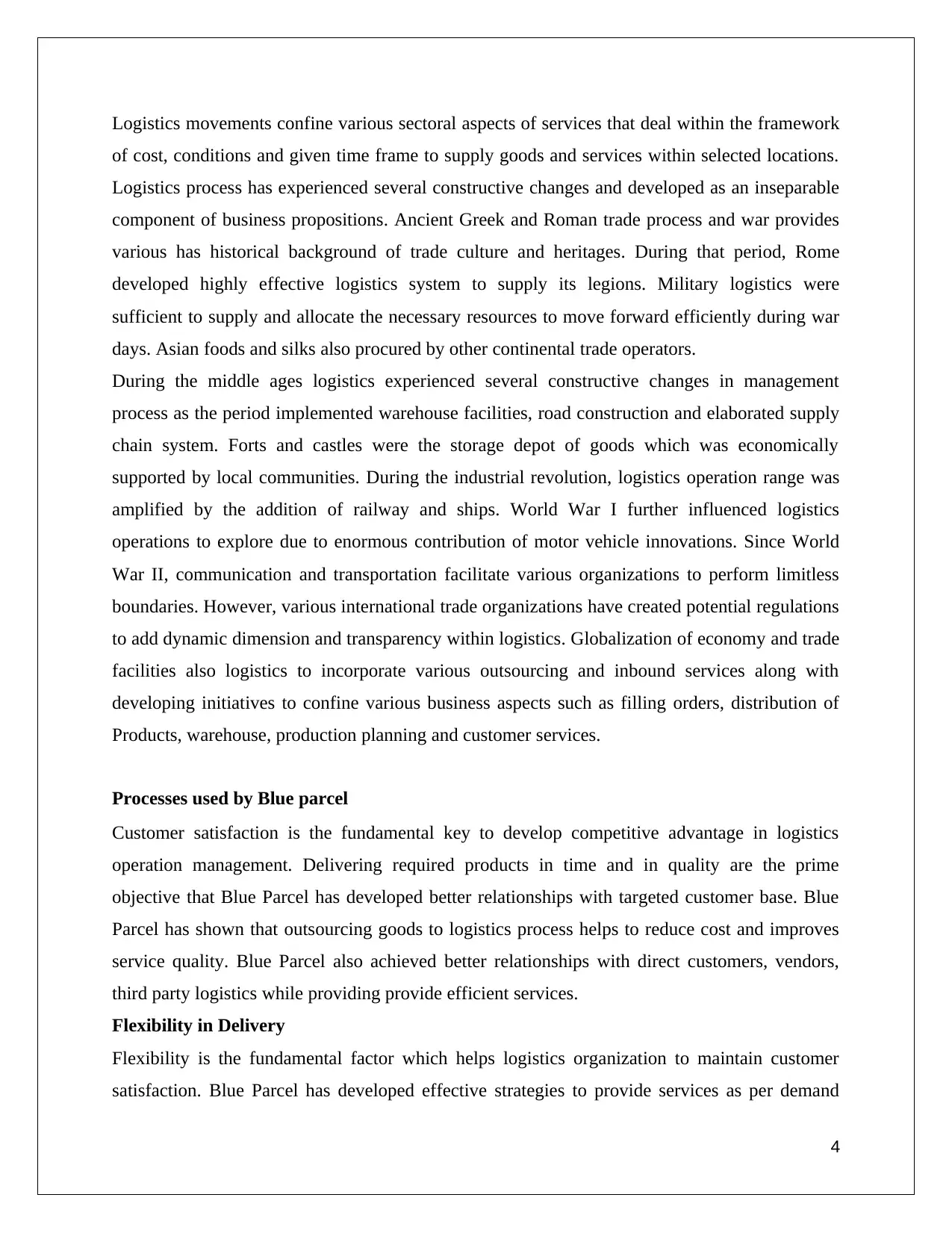
Logistics movements confine various sectoral aspects of services that deal within the framework
of cost, conditions and given time frame to supply goods and services within selected locations.
Logistics process has experienced several constructive changes and developed as an inseparable
component of business propositions. Ancient Greek and Roman trade process and war provides
various has historical background of trade culture and heritages. During that period, Rome
developed highly effective logistics system to supply its legions. Military logistics were
sufficient to supply and allocate the necessary resources to move forward efficiently during war
days. Asian foods and silks also procured by other continental trade operators.
During the middle ages logistics experienced several constructive changes in management
process as the period implemented warehouse facilities, road construction and elaborated supply
chain system. Forts and castles were the storage depot of goods which was economically
supported by local communities. During the industrial revolution, logistics operation range was
amplified by the addition of railway and ships. World War I further influenced logistics
operations to explore due to enormous contribution of motor vehicle innovations. Since World
War II, communication and transportation facilitate various organizations to perform limitless
boundaries. However, various international trade organizations have created potential regulations
to add dynamic dimension and transparency within logistics. Globalization of economy and trade
facilities also logistics to incorporate various outsourcing and inbound services along with
developing initiatives to confine various business aspects such as filling orders, distribution of
Products, warehouse, production planning and customer services.
Processes used by Blue parcel
Customer satisfaction is the fundamental key to develop competitive advantage in logistics
operation management. Delivering required products in time and in quality are the prime
objective that Blue Parcel has developed better relationships with targeted customer base. Blue
Parcel has shown that outsourcing goods to logistics process helps to reduce cost and improves
service quality. Blue Parcel also achieved better relationships with direct customers, vendors,
third party logistics while providing provide efficient services.
Flexibility in Delivery
Flexibility is the fundamental factor which helps logistics organization to maintain customer
satisfaction. Blue Parcel has developed effective strategies to provide services as per demand
4
of cost, conditions and given time frame to supply goods and services within selected locations.
Logistics process has experienced several constructive changes and developed as an inseparable
component of business propositions. Ancient Greek and Roman trade process and war provides
various has historical background of trade culture and heritages. During that period, Rome
developed highly effective logistics system to supply its legions. Military logistics were
sufficient to supply and allocate the necessary resources to move forward efficiently during war
days. Asian foods and silks also procured by other continental trade operators.
During the middle ages logistics experienced several constructive changes in management
process as the period implemented warehouse facilities, road construction and elaborated supply
chain system. Forts and castles were the storage depot of goods which was economically
supported by local communities. During the industrial revolution, logistics operation range was
amplified by the addition of railway and ships. World War I further influenced logistics
operations to explore due to enormous contribution of motor vehicle innovations. Since World
War II, communication and transportation facilitate various organizations to perform limitless
boundaries. However, various international trade organizations have created potential regulations
to add dynamic dimension and transparency within logistics. Globalization of economy and trade
facilities also logistics to incorporate various outsourcing and inbound services along with
developing initiatives to confine various business aspects such as filling orders, distribution of
Products, warehouse, production planning and customer services.
Processes used by Blue parcel
Customer satisfaction is the fundamental key to develop competitive advantage in logistics
operation management. Delivering required products in time and in quality are the prime
objective that Blue Parcel has developed better relationships with targeted customer base. Blue
Parcel has shown that outsourcing goods to logistics process helps to reduce cost and improves
service quality. Blue Parcel also achieved better relationships with direct customers, vendors,
third party logistics while providing provide efficient services.
Flexibility in Delivery
Flexibility is the fundamental factor which helps logistics organization to maintain customer
satisfaction. Blue Parcel has developed effective strategies to provide services as per demand
4
Paraphrase This Document
Need a fresh take? Get an instant paraphrase of this document with our AI Paraphraser
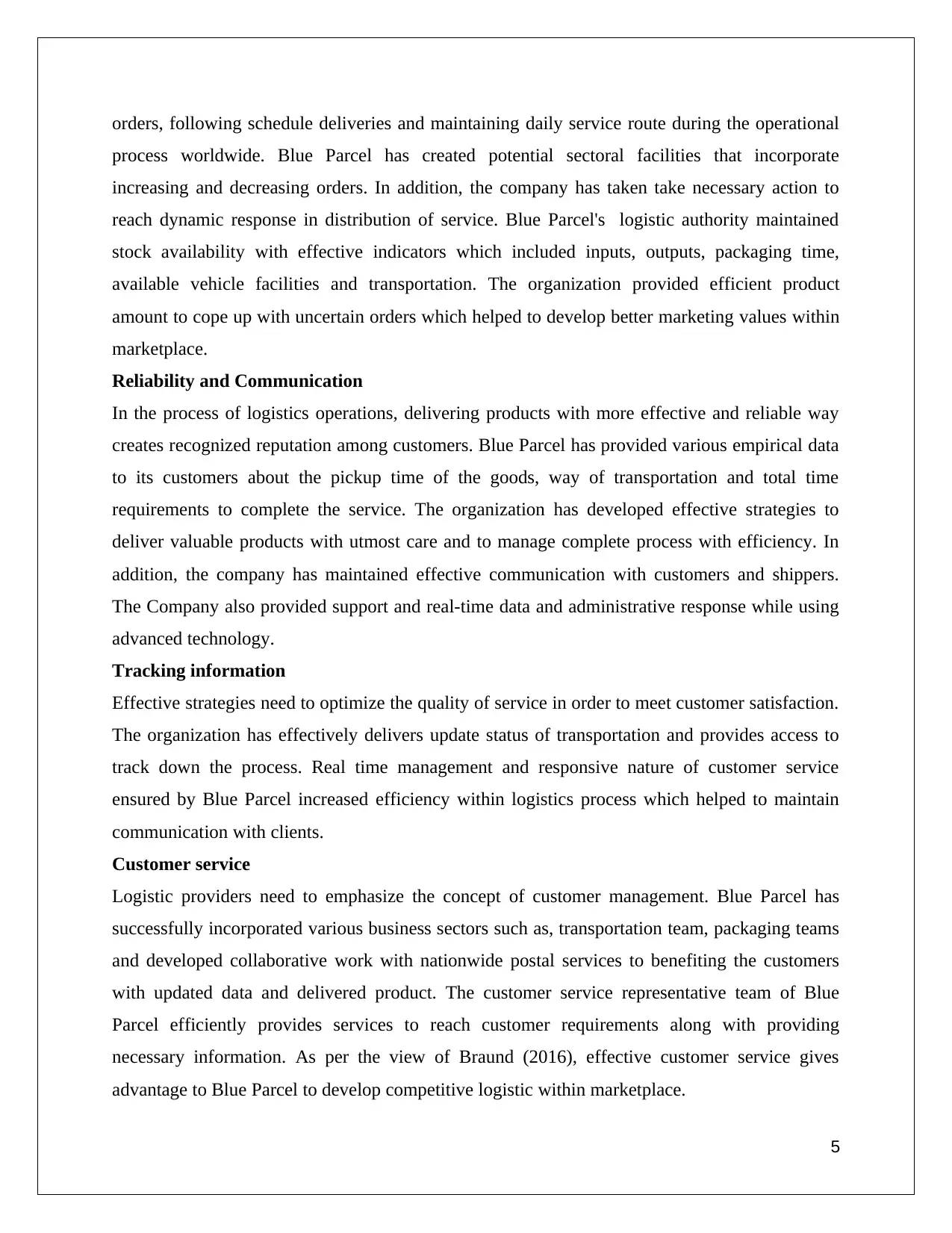
orders, following schedule deliveries and maintaining daily service route during the operational
process worldwide. Blue Parcel has created potential sectoral facilities that incorporate
increasing and decreasing orders. In addition, the company has taken take necessary action to
reach dynamic response in distribution of service. Blue Parcel's logistic authority maintained
stock availability with effective indicators which included inputs, outputs, packaging time,
available vehicle facilities and transportation. The organization provided efficient product
amount to cope up with uncertain orders which helped to develop better marketing values within
marketplace.
Reliability and Communication
In the process of logistics operations, delivering products with more effective and reliable way
creates recognized reputation among customers. Blue Parcel has provided various empirical data
to its customers about the pickup time of the goods, way of transportation and total time
requirements to complete the service. The organization has developed effective strategies to
deliver valuable products with utmost care and to manage complete process with efficiency. In
addition, the company has maintained effective communication with customers and shippers.
The Company also provided support and real-time data and administrative response while using
advanced technology.
Tracking information
Effective strategies need to optimize the quality of service in order to meet customer satisfaction.
The organization has effectively delivers update status of transportation and provides access to
track down the process. Real time management and responsive nature of customer service
ensured by Blue Parcel increased efficiency within logistics process which helped to maintain
communication with clients.
Customer service
Logistic providers need to emphasize the concept of customer management. Blue Parcel has
successfully incorporated various business sectors such as, transportation team, packaging teams
and developed collaborative work with nationwide postal services to benefiting the customers
with updated data and delivered product. The customer service representative team of Blue
Parcel efficiently provides services to reach customer requirements along with providing
necessary information. As per the view of Braund (2016), effective customer service gives
advantage to Blue Parcel to develop competitive logistic within marketplace.
5
process worldwide. Blue Parcel has created potential sectoral facilities that incorporate
increasing and decreasing orders. In addition, the company has taken take necessary action to
reach dynamic response in distribution of service. Blue Parcel's logistic authority maintained
stock availability with effective indicators which included inputs, outputs, packaging time,
available vehicle facilities and transportation. The organization provided efficient product
amount to cope up with uncertain orders which helped to develop better marketing values within
marketplace.
Reliability and Communication
In the process of logistics operations, delivering products with more effective and reliable way
creates recognized reputation among customers. Blue Parcel has provided various empirical data
to its customers about the pickup time of the goods, way of transportation and total time
requirements to complete the service. The organization has developed effective strategies to
deliver valuable products with utmost care and to manage complete process with efficiency. In
addition, the company has maintained effective communication with customers and shippers.
The Company also provided support and real-time data and administrative response while using
advanced technology.
Tracking information
Effective strategies need to optimize the quality of service in order to meet customer satisfaction.
The organization has effectively delivers update status of transportation and provides access to
track down the process. Real time management and responsive nature of customer service
ensured by Blue Parcel increased efficiency within logistics process which helped to maintain
communication with clients.
Customer service
Logistic providers need to emphasize the concept of customer management. Blue Parcel has
successfully incorporated various business sectors such as, transportation team, packaging teams
and developed collaborative work with nationwide postal services to benefiting the customers
with updated data and delivered product. The customer service representative team of Blue
Parcel efficiently provides services to reach customer requirements along with providing
necessary information. As per the view of Braund (2016), effective customer service gives
advantage to Blue Parcel to develop competitive logistic within marketplace.
5
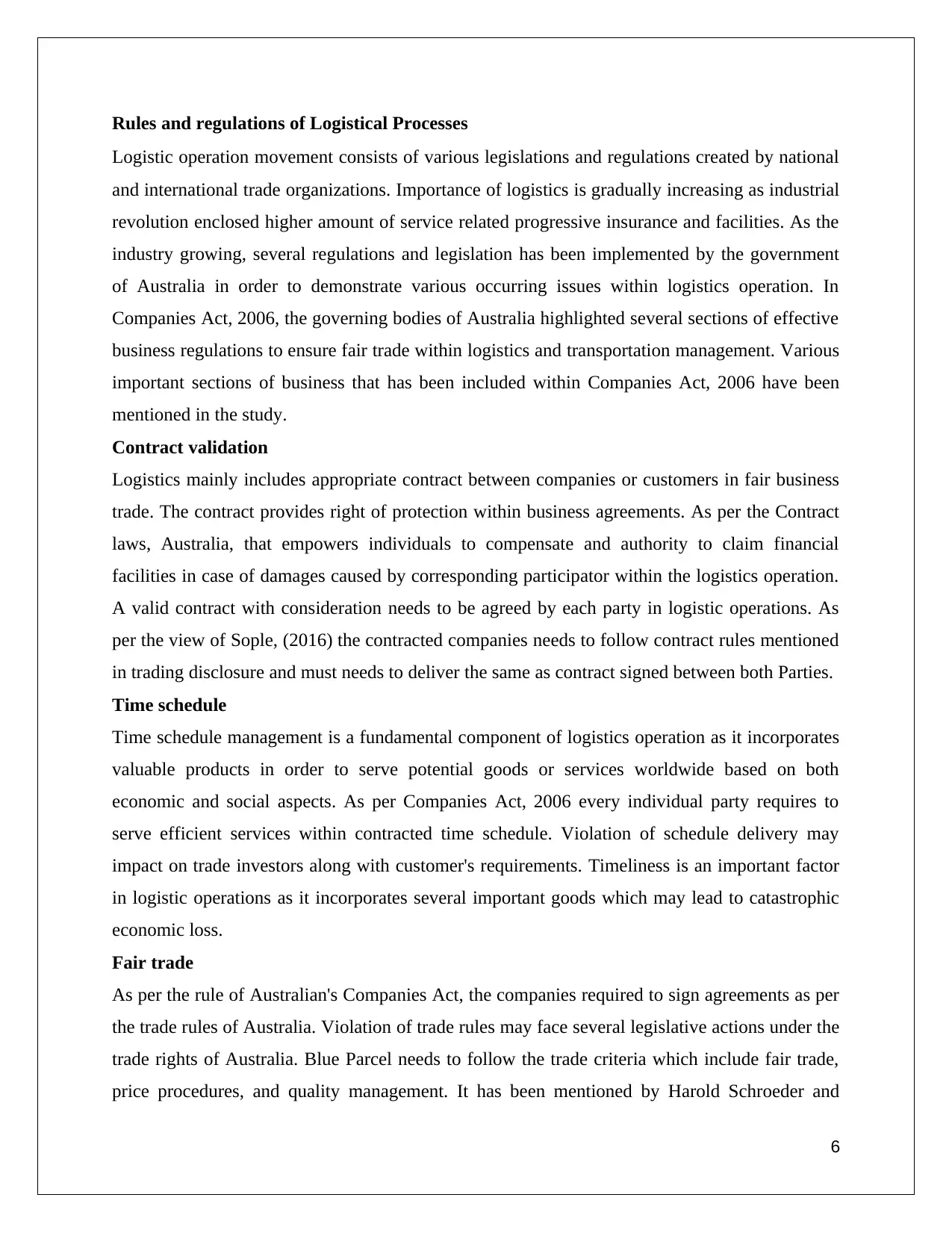
Rules and regulations of Logistical Processes
Logistic operation movement consists of various legislations and regulations created by national
and international trade organizations. Importance of logistics is gradually increasing as industrial
revolution enclosed higher amount of service related progressive insurance and facilities. As the
industry growing, several regulations and legislation has been implemented by the government
of Australia in order to demonstrate various occurring issues within logistics operation. In
Companies Act, 2006, the governing bodies of Australia highlighted several sections of effective
business regulations to ensure fair trade within logistics and transportation management. Various
important sections of business that has been included within Companies Act, 2006 have been
mentioned in the study.
Contract validation
Logistics mainly includes appropriate contract between companies or customers in fair business
trade. The contract provides right of protection within business agreements. As per the Contract
laws, Australia, that empowers individuals to compensate and authority to claim financial
facilities in case of damages caused by corresponding participator within the logistics operation.
A valid contract with consideration needs to be agreed by each party in logistic operations. As
per the view of Sople, (2016) the contracted companies needs to follow contract rules mentioned
in trading disclosure and must needs to deliver the same as contract signed between both Parties.
Time schedule
Time schedule management is a fundamental component of logistics operation as it incorporates
valuable products in order to serve potential goods or services worldwide based on both
economic and social aspects. As per Companies Act, 2006 every individual party requires to
serve efficient services within contracted time schedule. Violation of schedule delivery may
impact on trade investors along with customer's requirements. Timeliness is an important factor
in logistic operations as it incorporates several important goods which may lead to catastrophic
economic loss.
Fair trade
As per the rule of Australian's Companies Act, the companies required to sign agreements as per
the trade rules of Australia. Violation of trade rules may face several legislative actions under the
trade rights of Australia. Blue Parcel needs to follow the trade criteria which include fair trade,
price procedures, and quality management. It has been mentioned by Harold Schroeder and
6
Logistic operation movement consists of various legislations and regulations created by national
and international trade organizations. Importance of logistics is gradually increasing as industrial
revolution enclosed higher amount of service related progressive insurance and facilities. As the
industry growing, several regulations and legislation has been implemented by the government
of Australia in order to demonstrate various occurring issues within logistics operation. In
Companies Act, 2006, the governing bodies of Australia highlighted several sections of effective
business regulations to ensure fair trade within logistics and transportation management. Various
important sections of business that has been included within Companies Act, 2006 have been
mentioned in the study.
Contract validation
Logistics mainly includes appropriate contract between companies or customers in fair business
trade. The contract provides right of protection within business agreements. As per the Contract
laws, Australia, that empowers individuals to compensate and authority to claim financial
facilities in case of damages caused by corresponding participator within the logistics operation.
A valid contract with consideration needs to be agreed by each party in logistic operations. As
per the view of Sople, (2016) the contracted companies needs to follow contract rules mentioned
in trading disclosure and must needs to deliver the same as contract signed between both Parties.
Time schedule
Time schedule management is a fundamental component of logistics operation as it incorporates
valuable products in order to serve potential goods or services worldwide based on both
economic and social aspects. As per Companies Act, 2006 every individual party requires to
serve efficient services within contracted time schedule. Violation of schedule delivery may
impact on trade investors along with customer's requirements. Timeliness is an important factor
in logistic operations as it incorporates several important goods which may lead to catastrophic
economic loss.
Fair trade
As per the rule of Australian's Companies Act, the companies required to sign agreements as per
the trade rules of Australia. Violation of trade rules may face several legislative actions under the
trade rights of Australia. Blue Parcel needs to follow the trade criteria which include fair trade,
price procedures, and quality management. It has been mentioned by Harold Schroeder and
6
⊘ This is a preview!⊘
Do you want full access?
Subscribe today to unlock all pages.

Trusted by 1+ million students worldwide
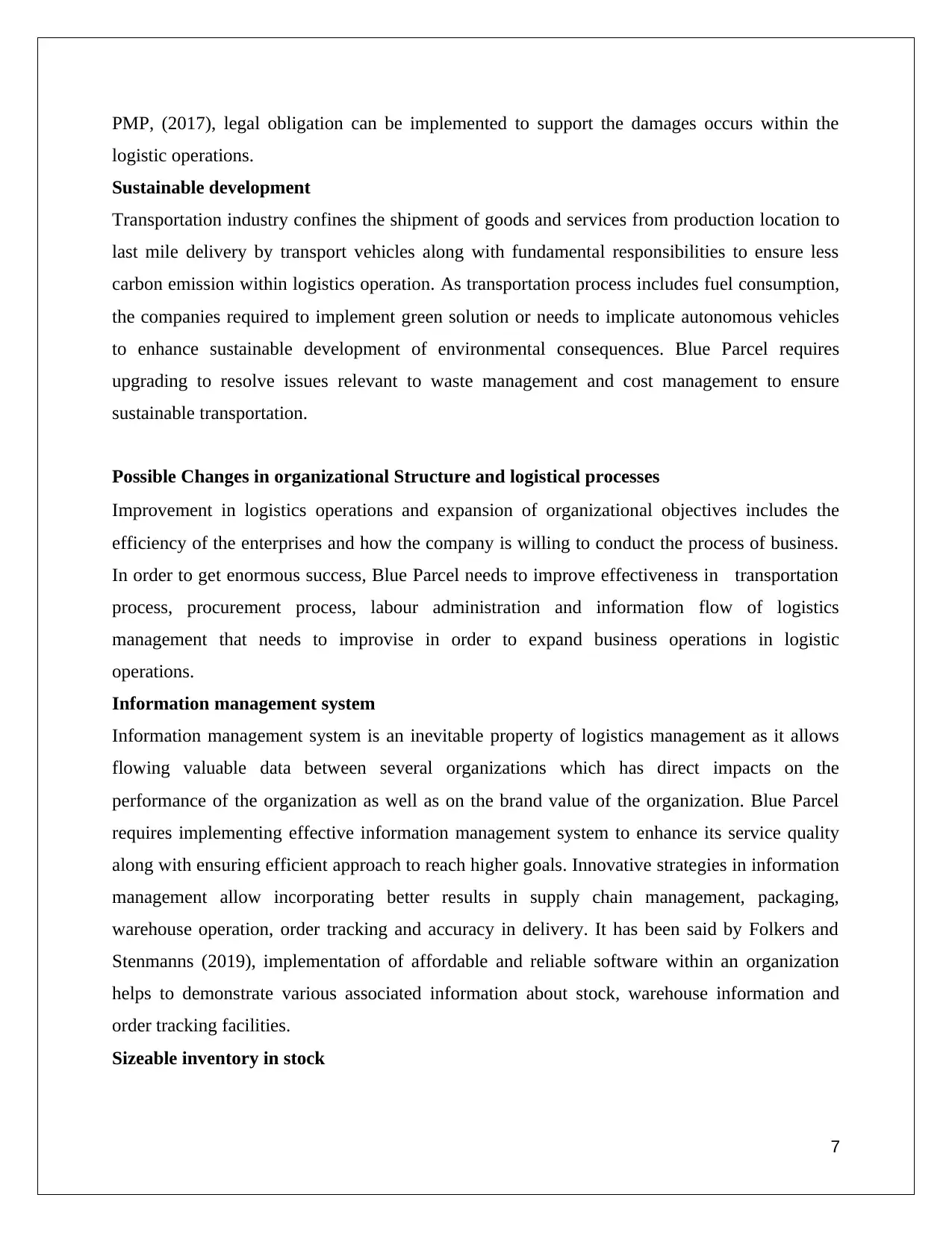
PMP, (2017), legal obligation can be implemented to support the damages occurs within the
logistic operations.
Sustainable development
Transportation industry confines the shipment of goods and services from production location to
last mile delivery by transport vehicles along with fundamental responsibilities to ensure less
carbon emission within logistics operation. As transportation process includes fuel consumption,
the companies required to implement green solution or needs to implicate autonomous vehicles
to enhance sustainable development of environmental consequences. Blue Parcel requires
upgrading to resolve issues relevant to waste management and cost management to ensure
sustainable transportation.
Possible Changes in organizational Structure and logistical processes
Improvement in logistics operations and expansion of organizational objectives includes the
efficiency of the enterprises and how the company is willing to conduct the process of business.
In order to get enormous success, Blue Parcel needs to improve effectiveness in transportation
process, procurement process, labour administration and information flow of logistics
management that needs to improvise in order to expand business operations in logistic
operations.
Information management system
Information management system is an inevitable property of logistics management as it allows
flowing valuable data between several organizations which has direct impacts on the
performance of the organization as well as on the brand value of the organization. Blue Parcel
requires implementing effective information management system to enhance its service quality
along with ensuring efficient approach to reach higher goals. Innovative strategies in information
management allow incorporating better results in supply chain management, packaging,
warehouse operation, order tracking and accuracy in delivery. It has been said by Folkers and
Stenmanns (2019), implementation of affordable and reliable software within an organization
helps to demonstrate various associated information about stock, warehouse information and
order tracking facilities.
Sizeable inventory in stock
7
logistic operations.
Sustainable development
Transportation industry confines the shipment of goods and services from production location to
last mile delivery by transport vehicles along with fundamental responsibilities to ensure less
carbon emission within logistics operation. As transportation process includes fuel consumption,
the companies required to implement green solution or needs to implicate autonomous vehicles
to enhance sustainable development of environmental consequences. Blue Parcel requires
upgrading to resolve issues relevant to waste management and cost management to ensure
sustainable transportation.
Possible Changes in organizational Structure and logistical processes
Improvement in logistics operations and expansion of organizational objectives includes the
efficiency of the enterprises and how the company is willing to conduct the process of business.
In order to get enormous success, Blue Parcel needs to improve effectiveness in transportation
process, procurement process, labour administration and information flow of logistics
management that needs to improvise in order to expand business operations in logistic
operations.
Information management system
Information management system is an inevitable property of logistics management as it allows
flowing valuable data between several organizations which has direct impacts on the
performance of the organization as well as on the brand value of the organization. Blue Parcel
requires implementing effective information management system to enhance its service quality
along with ensuring efficient approach to reach higher goals. Innovative strategies in information
management allow incorporating better results in supply chain management, packaging,
warehouse operation, order tracking and accuracy in delivery. It has been said by Folkers and
Stenmanns (2019), implementation of affordable and reliable software within an organization
helps to demonstrate various associated information about stock, warehouse information and
order tracking facilities.
Sizeable inventory in stock
7
Paraphrase This Document
Need a fresh take? Get an instant paraphrase of this document with our AI Paraphraser
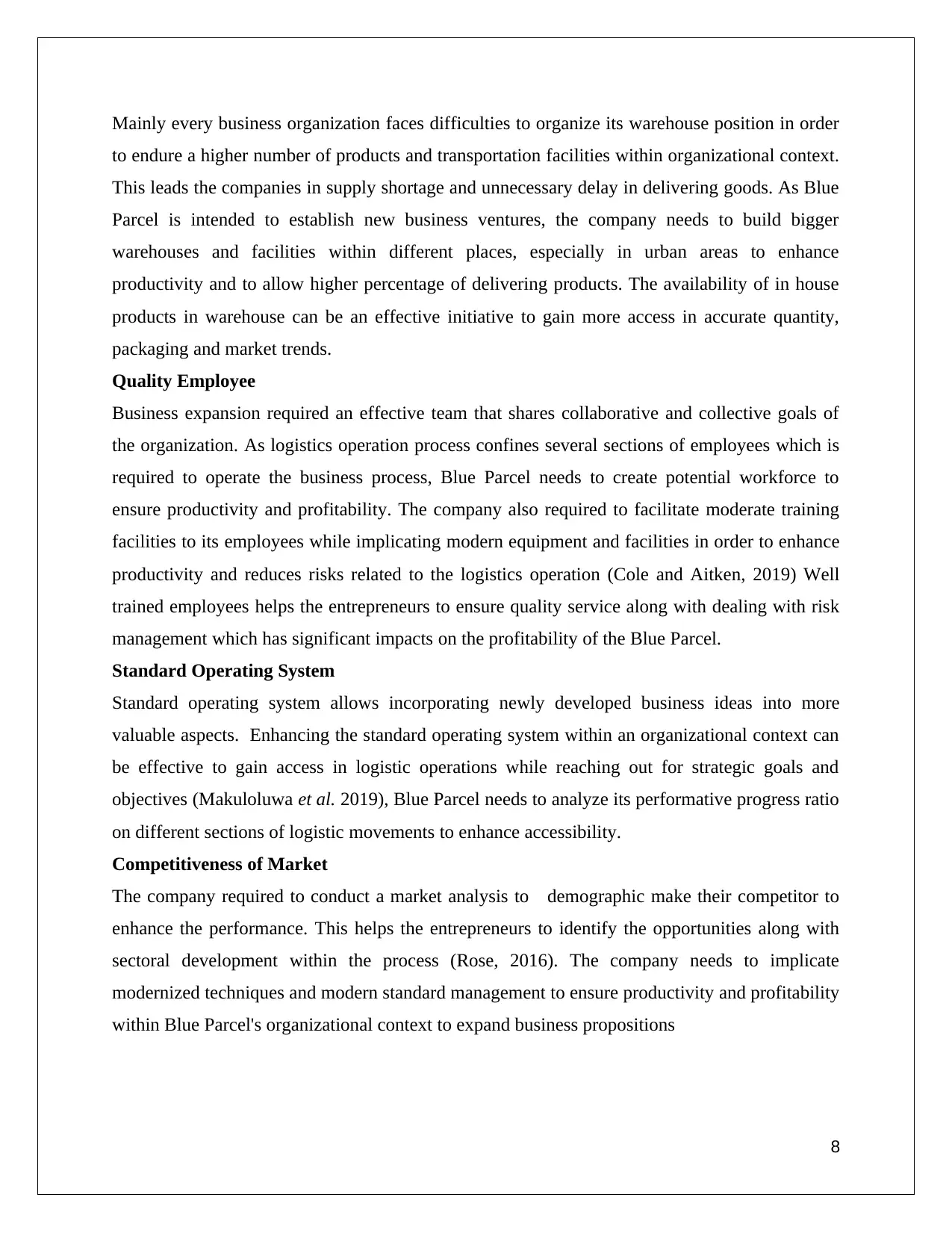
Mainly every business organization faces difficulties to organize its warehouse position in order
to endure a higher number of products and transportation facilities within organizational context.
This leads the companies in supply shortage and unnecessary delay in delivering goods. As Blue
Parcel is intended to establish new business ventures, the company needs to build bigger
warehouses and facilities within different places, especially in urban areas to enhance
productivity and to allow higher percentage of delivering products. The availability of in house
products in warehouse can be an effective initiative to gain more access in accurate quantity,
packaging and market trends.
Quality Employee
Business expansion required an effective team that shares collaborative and collective goals of
the organization. As logistics operation process confines several sections of employees which is
required to operate the business process, Blue Parcel needs to create potential workforce to
ensure productivity and profitability. The company also required to facilitate moderate training
facilities to its employees while implicating modern equipment and facilities in order to enhance
productivity and reduces risks related to the logistics operation (Cole and Aitken, 2019) Well
trained employees helps the entrepreneurs to ensure quality service along with dealing with risk
management which has significant impacts on the profitability of the Blue Parcel.
Standard Operating System
Standard operating system allows incorporating newly developed business ideas into more
valuable aspects. Enhancing the standard operating system within an organizational context can
be effective to gain access in logistic operations while reaching out for strategic goals and
objectives (Makuloluwa et al. 2019), Blue Parcel needs to analyze its performative progress ratio
on different sections of logistic movements to enhance accessibility.
Competitiveness of Market
The company required to conduct a market analysis to demographic make their competitor to
enhance the performance. This helps the entrepreneurs to identify the opportunities along with
sectoral development within the process (Rose, 2016). The company needs to implicate
modernized techniques and modern standard management to ensure productivity and profitability
within Blue Parcel's organizational context to expand business propositions
8
to endure a higher number of products and transportation facilities within organizational context.
This leads the companies in supply shortage and unnecessary delay in delivering goods. As Blue
Parcel is intended to establish new business ventures, the company needs to build bigger
warehouses and facilities within different places, especially in urban areas to enhance
productivity and to allow higher percentage of delivering products. The availability of in house
products in warehouse can be an effective initiative to gain more access in accurate quantity,
packaging and market trends.
Quality Employee
Business expansion required an effective team that shares collaborative and collective goals of
the organization. As logistics operation process confines several sections of employees which is
required to operate the business process, Blue Parcel needs to create potential workforce to
ensure productivity and profitability. The company also required to facilitate moderate training
facilities to its employees while implicating modern equipment and facilities in order to enhance
productivity and reduces risks related to the logistics operation (Cole and Aitken, 2019) Well
trained employees helps the entrepreneurs to ensure quality service along with dealing with risk
management which has significant impacts on the profitability of the Blue Parcel.
Standard Operating System
Standard operating system allows incorporating newly developed business ideas into more
valuable aspects. Enhancing the standard operating system within an organizational context can
be effective to gain access in logistic operations while reaching out for strategic goals and
objectives (Makuloluwa et al. 2019), Blue Parcel needs to analyze its performative progress ratio
on different sections of logistic movements to enhance accessibility.
Competitiveness of Market
The company required to conduct a market analysis to demographic make their competitor to
enhance the performance. This helps the entrepreneurs to identify the opportunities along with
sectoral development within the process (Rose, 2016). The company needs to implicate
modernized techniques and modern standard management to ensure productivity and profitability
within Blue Parcel's organizational context to expand business propositions
8
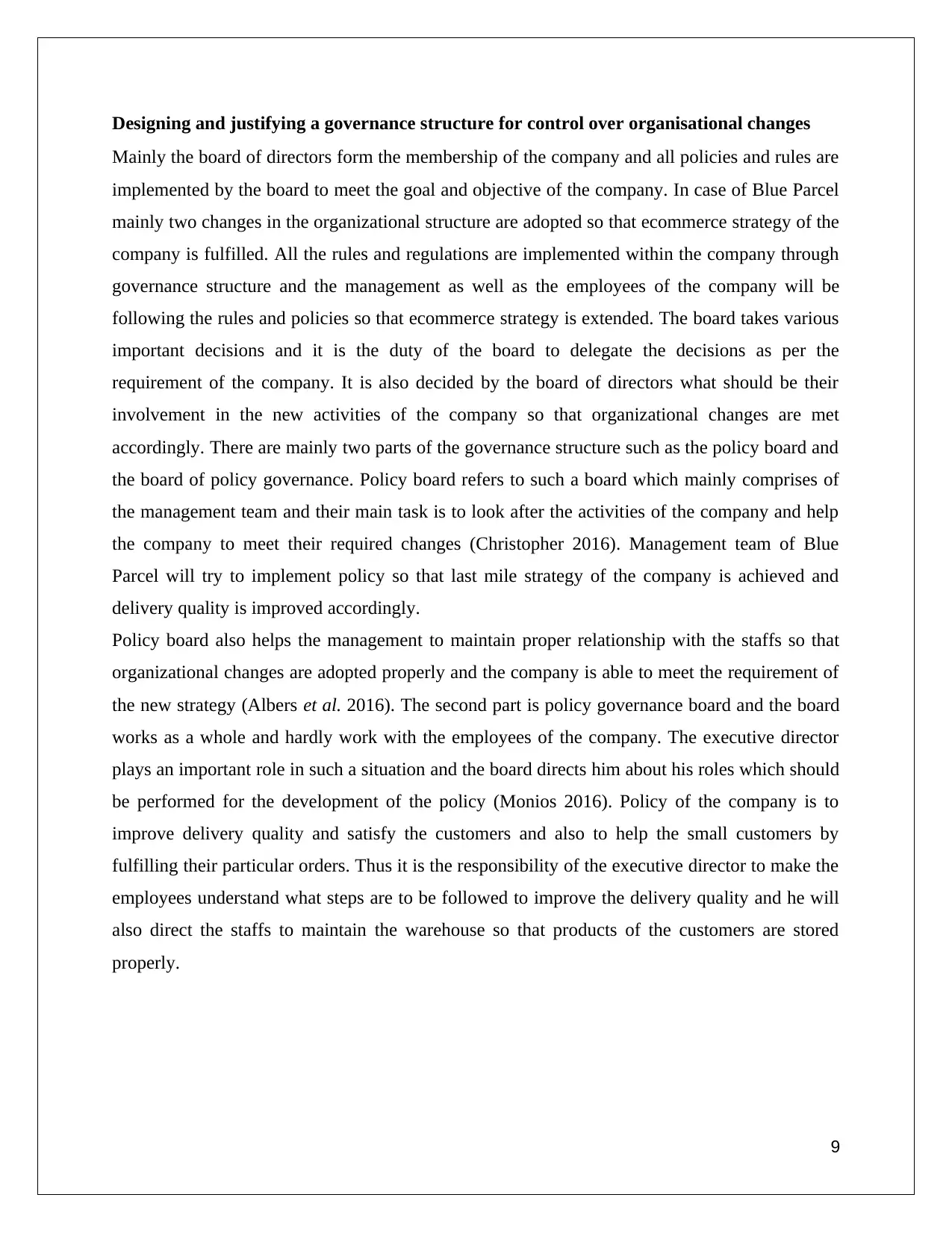
Designing and justifying a governance structure for control over organisational changes
Mainly the board of directors form the membership of the company and all policies and rules are
implemented by the board to meet the goal and objective of the company. In case of Blue Parcel
mainly two changes in the organizational structure are adopted so that ecommerce strategy of the
company is fulfilled. All the rules and regulations are implemented within the company through
governance structure and the management as well as the employees of the company will be
following the rules and policies so that ecommerce strategy is extended. The board takes various
important decisions and it is the duty of the board to delegate the decisions as per the
requirement of the company. It is also decided by the board of directors what should be their
involvement in the new activities of the company so that organizational changes are met
accordingly. There are mainly two parts of the governance structure such as the policy board and
the board of policy governance. Policy board refers to such a board which mainly comprises of
the management team and their main task is to look after the activities of the company and help
the company to meet their required changes (Christopher 2016). Management team of Blue
Parcel will try to implement policy so that last mile strategy of the company is achieved and
delivery quality is improved accordingly.
Policy board also helps the management to maintain proper relationship with the staffs so that
organizational changes are adopted properly and the company is able to meet the requirement of
the new strategy (Albers et al. 2016). The second part is policy governance board and the board
works as a whole and hardly work with the employees of the company. The executive director
plays an important role in such a situation and the board directs him about his roles which should
be performed for the development of the policy (Monios 2016). Policy of the company is to
improve delivery quality and satisfy the customers and also to help the small customers by
fulfilling their particular orders. Thus it is the responsibility of the executive director to make the
employees understand what steps are to be followed to improve the delivery quality and he will
also direct the staffs to maintain the warehouse so that products of the customers are stored
properly.
9
Mainly the board of directors form the membership of the company and all policies and rules are
implemented by the board to meet the goal and objective of the company. In case of Blue Parcel
mainly two changes in the organizational structure are adopted so that ecommerce strategy of the
company is fulfilled. All the rules and regulations are implemented within the company through
governance structure and the management as well as the employees of the company will be
following the rules and policies so that ecommerce strategy is extended. The board takes various
important decisions and it is the duty of the board to delegate the decisions as per the
requirement of the company. It is also decided by the board of directors what should be their
involvement in the new activities of the company so that organizational changes are met
accordingly. There are mainly two parts of the governance structure such as the policy board and
the board of policy governance. Policy board refers to such a board which mainly comprises of
the management team and their main task is to look after the activities of the company and help
the company to meet their required changes (Christopher 2016). Management team of Blue
Parcel will try to implement policy so that last mile strategy of the company is achieved and
delivery quality is improved accordingly.
Policy board also helps the management to maintain proper relationship with the staffs so that
organizational changes are adopted properly and the company is able to meet the requirement of
the new strategy (Albers et al. 2016). The second part is policy governance board and the board
works as a whole and hardly work with the employees of the company. The executive director
plays an important role in such a situation and the board directs him about his roles which should
be performed for the development of the policy (Monios 2016). Policy of the company is to
improve delivery quality and satisfy the customers and also to help the small customers by
fulfilling their particular orders. Thus it is the responsibility of the executive director to make the
employees understand what steps are to be followed to improve the delivery quality and he will
also direct the staffs to maintain the warehouse so that products of the customers are stored
properly.
9
⊘ This is a preview!⊘
Do you want full access?
Subscribe today to unlock all pages.

Trusted by 1+ million students worldwide
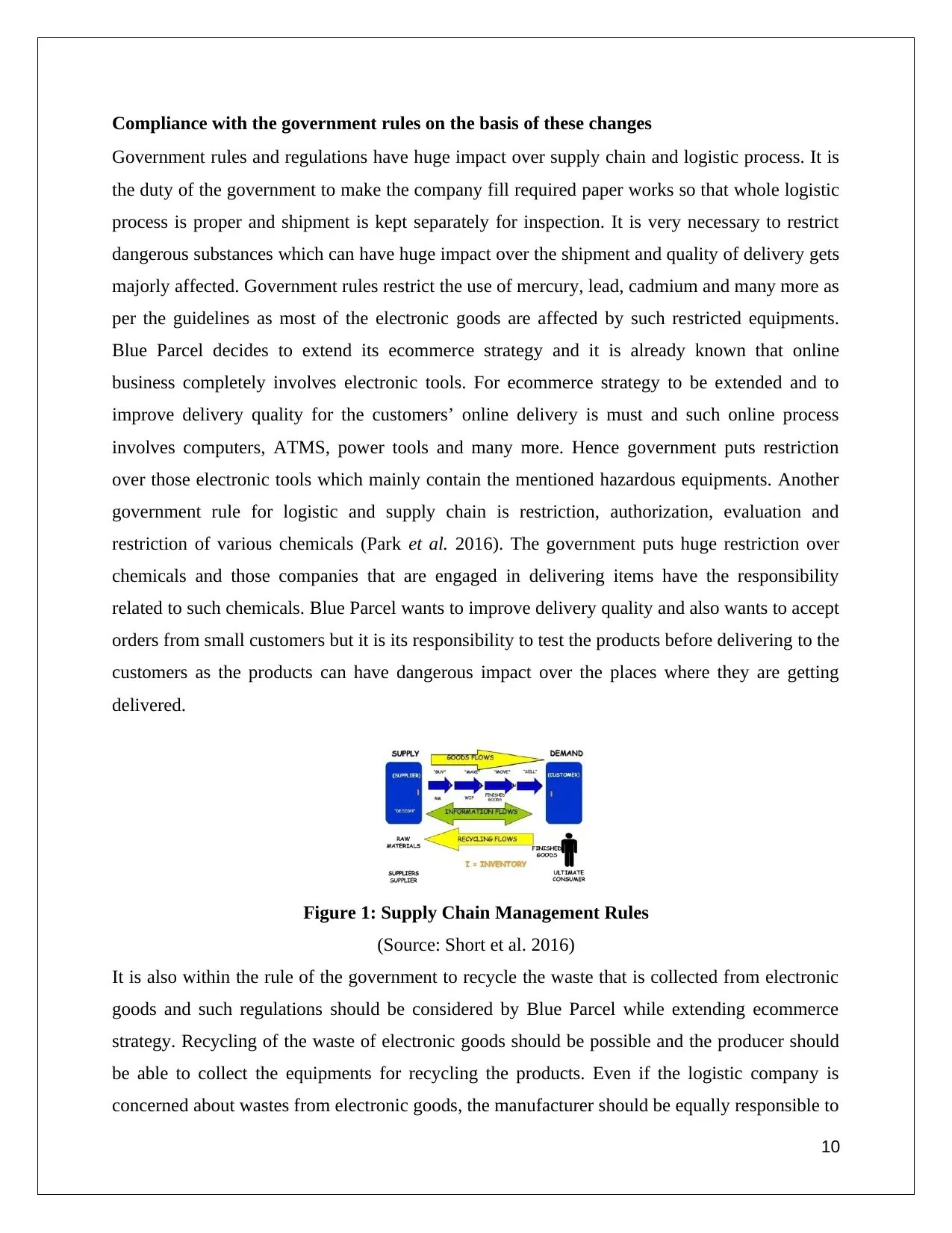
Compliance with the government rules on the basis of these changes
Government rules and regulations have huge impact over supply chain and logistic process. It is
the duty of the government to make the company fill required paper works so that whole logistic
process is proper and shipment is kept separately for inspection. It is very necessary to restrict
dangerous substances which can have huge impact over the shipment and quality of delivery gets
majorly affected. Government rules restrict the use of mercury, lead, cadmium and many more as
per the guidelines as most of the electronic goods are affected by such restricted equipments.
Blue Parcel decides to extend its ecommerce strategy and it is already known that online
business completely involves electronic tools. For ecommerce strategy to be extended and to
improve delivery quality for the customers’ online delivery is must and such online process
involves computers, ATMS, power tools and many more. Hence government puts restriction
over those electronic tools which mainly contain the mentioned hazardous equipments. Another
government rule for logistic and supply chain is restriction, authorization, evaluation and
restriction of various chemicals (Park et al. 2016). The government puts huge restriction over
chemicals and those companies that are engaged in delivering items have the responsibility
related to such chemicals. Blue Parcel wants to improve delivery quality and also wants to accept
orders from small customers but it is its responsibility to test the products before delivering to the
customers as the products can have dangerous impact over the places where they are getting
delivered.
Figure 1: Supply Chain Management Rules
(Source: Short et al. 2016)
It is also within the rule of the government to recycle the waste that is collected from electronic
goods and such regulations should be considered by Blue Parcel while extending ecommerce
strategy. Recycling of the waste of electronic goods should be possible and the producer should
be able to collect the equipments for recycling the products. Even if the logistic company is
concerned about wastes from electronic goods, the manufacturer should be equally responsible to
10
Government rules and regulations have huge impact over supply chain and logistic process. It is
the duty of the government to make the company fill required paper works so that whole logistic
process is proper and shipment is kept separately for inspection. It is very necessary to restrict
dangerous substances which can have huge impact over the shipment and quality of delivery gets
majorly affected. Government rules restrict the use of mercury, lead, cadmium and many more as
per the guidelines as most of the electronic goods are affected by such restricted equipments.
Blue Parcel decides to extend its ecommerce strategy and it is already known that online
business completely involves electronic tools. For ecommerce strategy to be extended and to
improve delivery quality for the customers’ online delivery is must and such online process
involves computers, ATMS, power tools and many more. Hence government puts restriction
over those electronic tools which mainly contain the mentioned hazardous equipments. Another
government rule for logistic and supply chain is restriction, authorization, evaluation and
restriction of various chemicals (Park et al. 2016). The government puts huge restriction over
chemicals and those companies that are engaged in delivering items have the responsibility
related to such chemicals. Blue Parcel wants to improve delivery quality and also wants to accept
orders from small customers but it is its responsibility to test the products before delivering to the
customers as the products can have dangerous impact over the places where they are getting
delivered.
Figure 1: Supply Chain Management Rules
(Source: Short et al. 2016)
It is also within the rule of the government to recycle the waste that is collected from electronic
goods and such regulations should be considered by Blue Parcel while extending ecommerce
strategy. Recycling of the waste of electronic goods should be possible and the producer should
be able to collect the equipments for recycling the products. Even if the logistic company is
concerned about wastes from electronic goods, the manufacturer should be equally responsible to
10
Paraphrase This Document
Need a fresh take? Get an instant paraphrase of this document with our AI Paraphraser
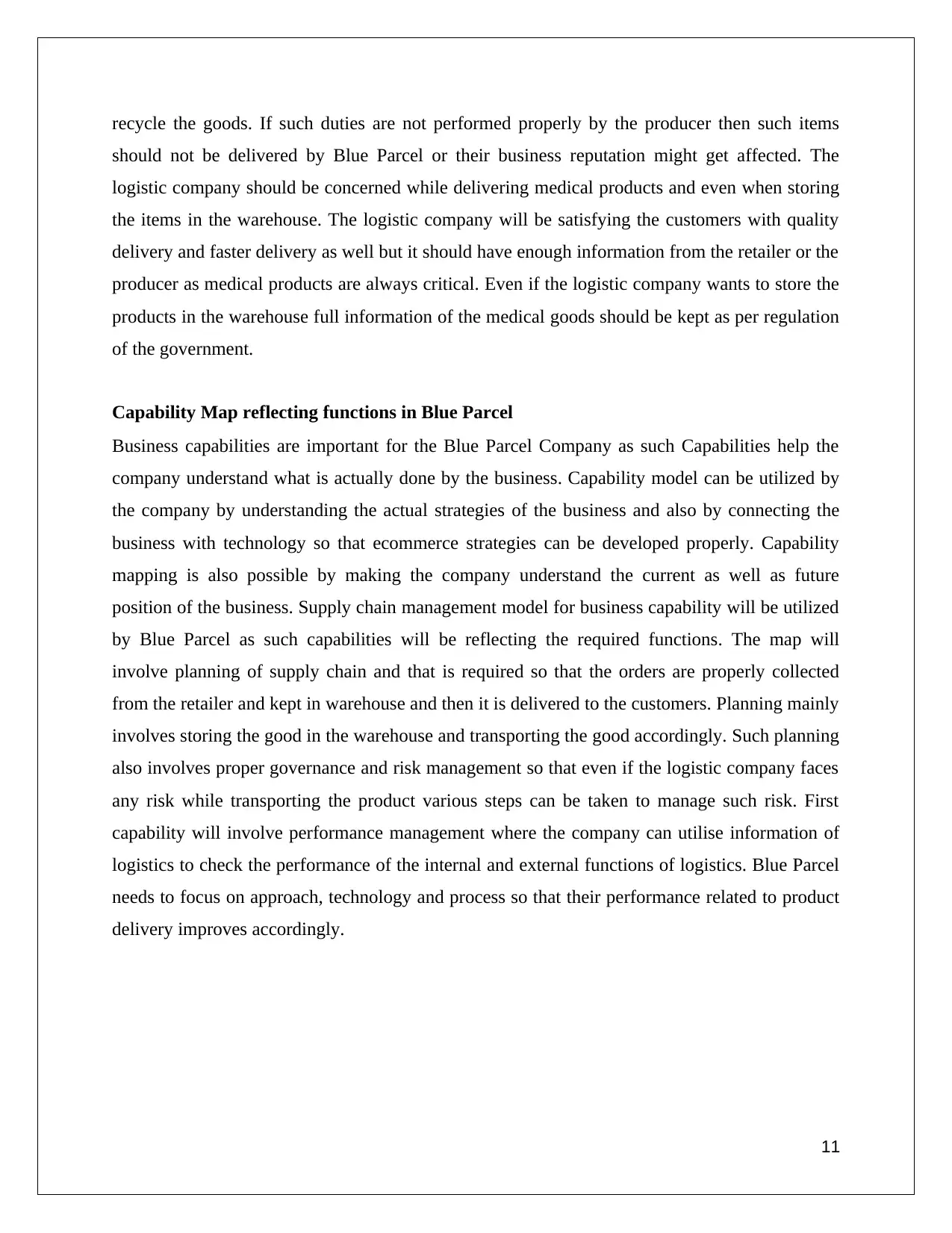
recycle the goods. If such duties are not performed properly by the producer then such items
should not be delivered by Blue Parcel or their business reputation might get affected. The
logistic company should be concerned while delivering medical products and even when storing
the items in the warehouse. The logistic company will be satisfying the customers with quality
delivery and faster delivery as well but it should have enough information from the retailer or the
producer as medical products are always critical. Even if the logistic company wants to store the
products in the warehouse full information of the medical goods should be kept as per regulation
of the government.
Capability Map reflecting functions in Blue Parcel
Business capabilities are important for the Blue Parcel Company as such Capabilities help the
company understand what is actually done by the business. Capability model can be utilized by
the company by understanding the actual strategies of the business and also by connecting the
business with technology so that ecommerce strategies can be developed properly. Capability
mapping is also possible by making the company understand the current as well as future
position of the business. Supply chain management model for business capability will be utilized
by Blue Parcel as such capabilities will be reflecting the required functions. The map will
involve planning of supply chain and that is required so that the orders are properly collected
from the retailer and kept in warehouse and then it is delivered to the customers. Planning mainly
involves storing the good in the warehouse and transporting the good accordingly. Such planning
also involves proper governance and risk management so that even if the logistic company faces
any risk while transporting the product various steps can be taken to manage such risk. First
capability will involve performance management where the company can utilise information of
logistics to check the performance of the internal and external functions of logistics. Blue Parcel
needs to focus on approach, technology and process so that their performance related to product
delivery improves accordingly.
11
should not be delivered by Blue Parcel or their business reputation might get affected. The
logistic company should be concerned while delivering medical products and even when storing
the items in the warehouse. The logistic company will be satisfying the customers with quality
delivery and faster delivery as well but it should have enough information from the retailer or the
producer as medical products are always critical. Even if the logistic company wants to store the
products in the warehouse full information of the medical goods should be kept as per regulation
of the government.
Capability Map reflecting functions in Blue Parcel
Business capabilities are important for the Blue Parcel Company as such Capabilities help the
company understand what is actually done by the business. Capability model can be utilized by
the company by understanding the actual strategies of the business and also by connecting the
business with technology so that ecommerce strategies can be developed properly. Capability
mapping is also possible by making the company understand the current as well as future
position of the business. Supply chain management model for business capability will be utilized
by Blue Parcel as such capabilities will be reflecting the required functions. The map will
involve planning of supply chain and that is required so that the orders are properly collected
from the retailer and kept in warehouse and then it is delivered to the customers. Planning mainly
involves storing the good in the warehouse and transporting the good accordingly. Such planning
also involves proper governance and risk management so that even if the logistic company faces
any risk while transporting the product various steps can be taken to manage such risk. First
capability will involve performance management where the company can utilise information of
logistics to check the performance of the internal and external functions of logistics. Blue Parcel
needs to focus on approach, technology and process so that their performance related to product
delivery improves accordingly.
11
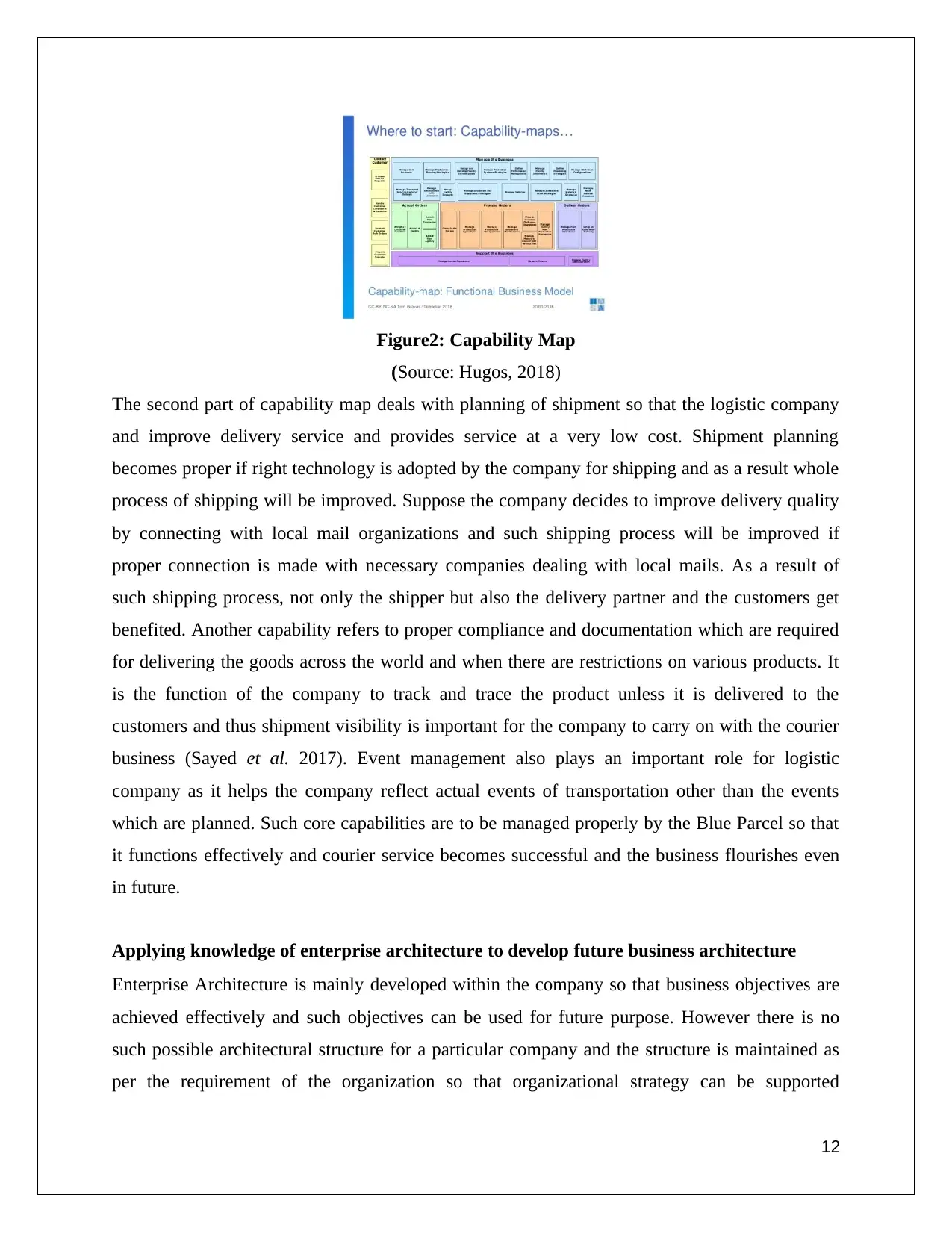
Figure2: Capability Map
(Source: Hugos, 2018)
The second part of capability map deals with planning of shipment so that the logistic company
and improve delivery service and provides service at a very low cost. Shipment planning
becomes proper if right technology is adopted by the company for shipping and as a result whole
process of shipping will be improved. Suppose the company decides to improve delivery quality
by connecting with local mail organizations and such shipping process will be improved if
proper connection is made with necessary companies dealing with local mails. As a result of
such shipping process, not only the shipper but also the delivery partner and the customers get
benefited. Another capability refers to proper compliance and documentation which are required
for delivering the goods across the world and when there are restrictions on various products. It
is the function of the company to track and trace the product unless it is delivered to the
customers and thus shipment visibility is important for the company to carry on with the courier
business (Sayed et al. 2017). Event management also plays an important role for logistic
company as it helps the company reflect actual events of transportation other than the events
which are planned. Such core capabilities are to be managed properly by the Blue Parcel so that
it functions effectively and courier service becomes successful and the business flourishes even
in future.
Applying knowledge of enterprise architecture to develop future business architecture
Enterprise Architecture is mainly developed within the company so that business objectives are
achieved effectively and such objectives can be used for future purpose. However there is no
such possible architectural structure for a particular company and the structure is maintained as
per the requirement of the organization so that organizational strategy can be supported
12
(Source: Hugos, 2018)
The second part of capability map deals with planning of shipment so that the logistic company
and improve delivery service and provides service at a very low cost. Shipment planning
becomes proper if right technology is adopted by the company for shipping and as a result whole
process of shipping will be improved. Suppose the company decides to improve delivery quality
by connecting with local mail organizations and such shipping process will be improved if
proper connection is made with necessary companies dealing with local mails. As a result of
such shipping process, not only the shipper but also the delivery partner and the customers get
benefited. Another capability refers to proper compliance and documentation which are required
for delivering the goods across the world and when there are restrictions on various products. It
is the function of the company to track and trace the product unless it is delivered to the
customers and thus shipment visibility is important for the company to carry on with the courier
business (Sayed et al. 2017). Event management also plays an important role for logistic
company as it helps the company reflect actual events of transportation other than the events
which are planned. Such core capabilities are to be managed properly by the Blue Parcel so that
it functions effectively and courier service becomes successful and the business flourishes even
in future.
Applying knowledge of enterprise architecture to develop future business architecture
Enterprise Architecture is mainly developed within the company so that business objectives are
achieved effectively and such objectives can be used for future purpose. However there is no
such possible architectural structure for a particular company and the structure is maintained as
per the requirement of the organization so that organizational strategy can be supported
12
⊘ This is a preview!⊘
Do you want full access?
Subscribe today to unlock all pages.

Trusted by 1+ million students worldwide
1 out of 22
Related Documents
Your All-in-One AI-Powered Toolkit for Academic Success.
+13062052269
info@desklib.com
Available 24*7 on WhatsApp / Email
![[object Object]](/_next/static/media/star-bottom.7253800d.svg)
Unlock your academic potential
Copyright © 2020–2026 A2Z Services. All Rights Reserved. Developed and managed by ZUCOL.





